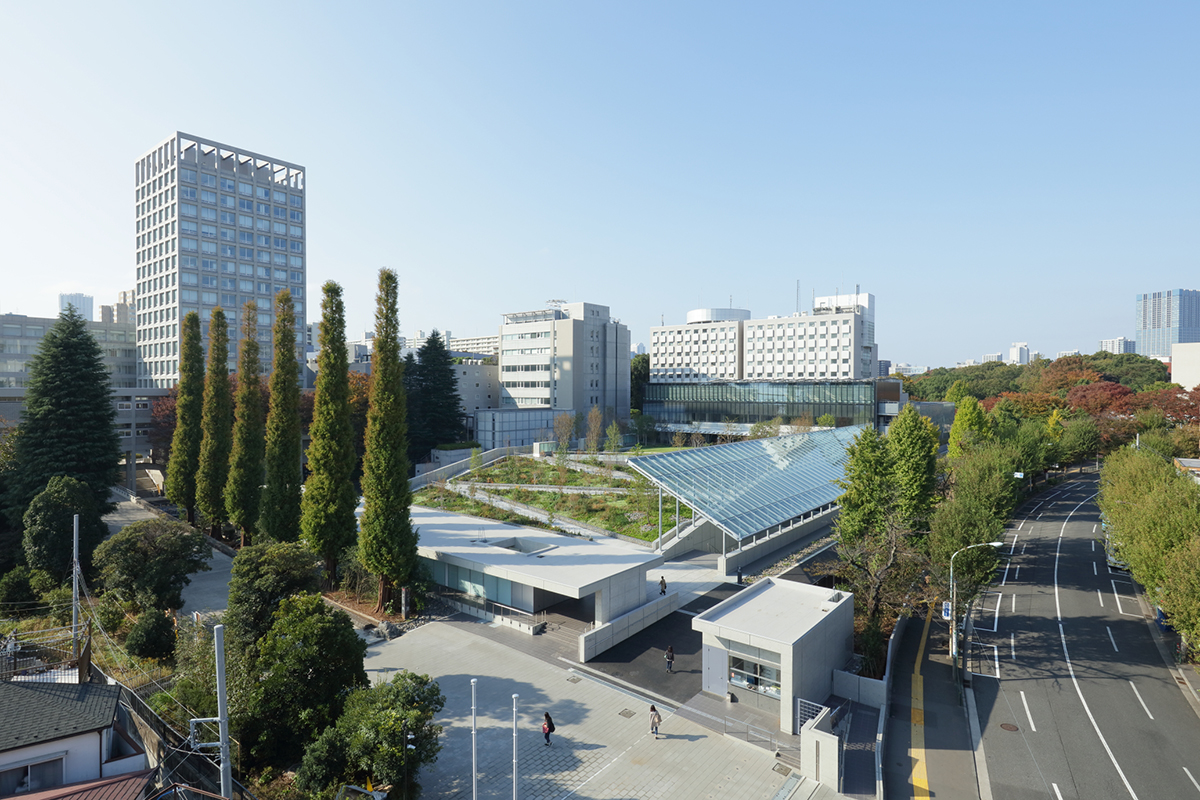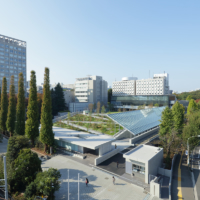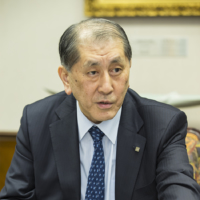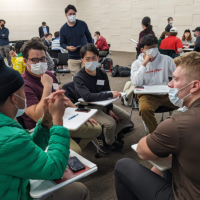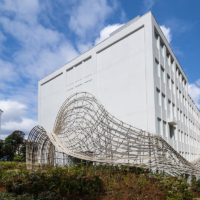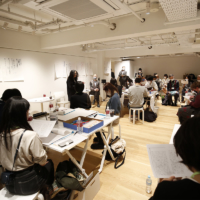Waseda University, one of Japan’s leading private universities, began its history as Tokyo Senmon Gakko, which was established in 1882. The founder, Shigenobu Okuma, served as Japan’s prime minister twice, in 1898 and 1914. Waseda has produced eight of the country’s prime ministers, including Fumio Kishida, and many leading players in politics, business and industry.
Aiji Tanaka, the 17th president of Waseda University and president of the Japan Association of Private Universities and Colleges, warns that there are two major issues facing Japan and its private universities: the declining population of 18-year-olds caused by the chronically low birth rate and rapidly aging population; and the fact that Japan lags other countries in digitalization.
“The population of 18-year-olds in Japan, which was 1.2 million in 2012, is expected to decline to less than 800,000 by 2050. The number of those who receive a higher education will be nearly half of that population, which could lead to a weakening of Japan’s international competitiveness,” Tanaka said.
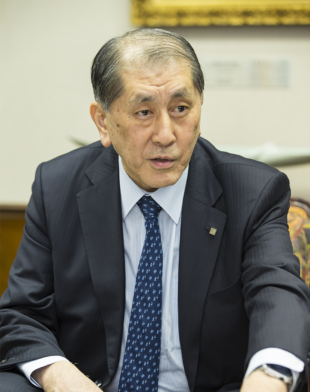
He also believes that one of the reasons for the delay in digitalization is the country’s conventional educational system, which is divided into humanities and sciences. “As a result, many people who major or majored in humanities lack knowledge of digitalization as well as science and technology, while current and former science majors who have expertise in science and technology are not well-equipped with skills to perceive people’s needs and psychology,” he said.
Since becoming Waseda University president in 2018, Tanaka has been making reforms that he believes are necessary “to nurture talented individuals who can be active in the world and make international contributions.”
Internationalization
Since its foundation, Waseda has accepted many exchange students, including those from China’s Qing Dynasty in 1899. The campus has a cosmopolitan feel, with students from more than 100 countries and regions. “The diversity of students serves as an environment where all students can interact daily with people of various values and backgrounds when they engage in volunteer and diversity-related activities, allowing each student to experience, recognize and embrace diversity,” Tanaka said. “Waseda provides an environment where everyone can find a ‘place to belong’ on equal footing.”
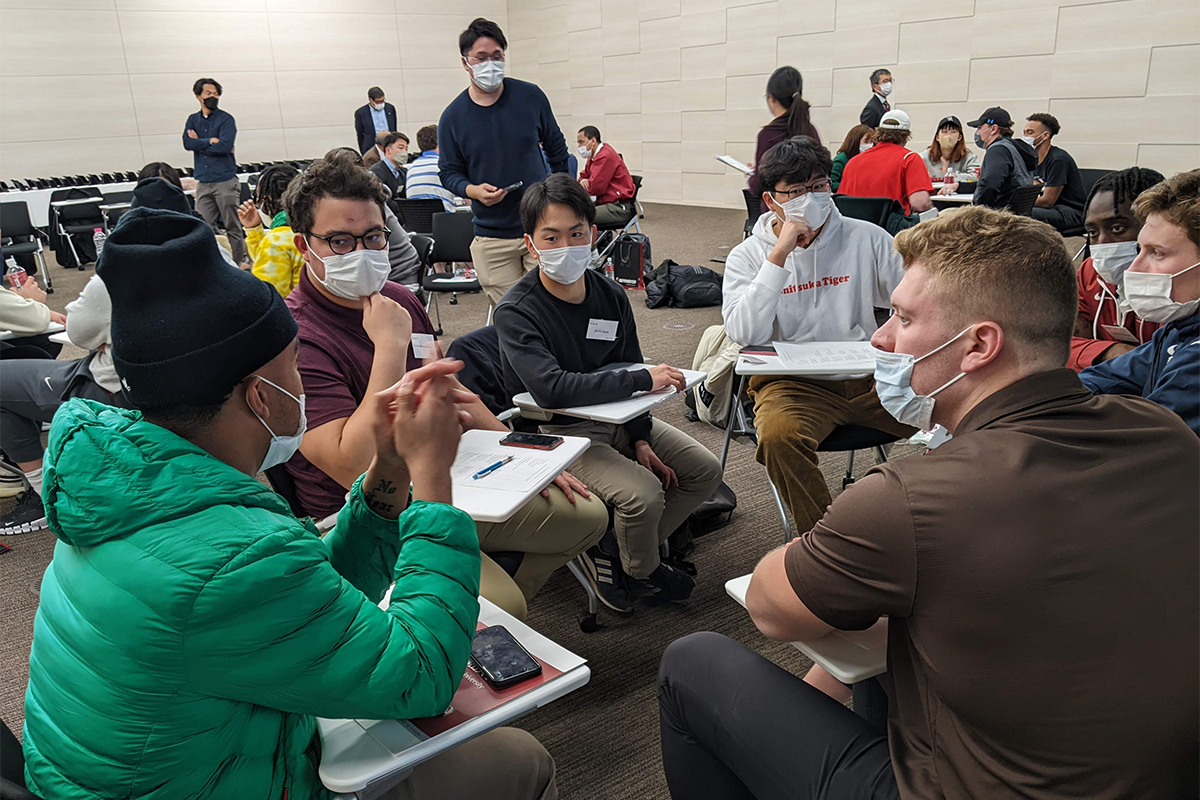
Citing founder Okuma’s remark on the 30th anniversary of the university’s founding that “It shall not be about one’s self, one’s family, or one’s nation. You must have the ambition to willingly contribute to the world,” Tanaka emphasized that talented individuals developed in an environment comprising a mix of diverse values should be able to demonstrate their abilities in various aspects of society and contribute to the world. “We believe that Waseda can become a university that people think of as the most effective choice if they aim to play active roles, whether in corporations, international organizations, communities or nonprofit organizations, for the benefit of others,” he said.
Aiming for carbon neutrality
One of the efforts that Waseda is committed to, with the aim of benefiting all of humanity, is the pursuit of “carbon neutrality.” “Net-zero emissions is an important project that determines the survival of human beings and nature,” Tanaka said. “We aim to create a new global value based on the principles of the (U.N.) sustainable development goals by integrating the findings acquired through our advanced efforts in the fields of education and research that contribute to the achievement of carbon neutrality.’’
To this end, he said the university declared the launch of “Waseda Carbon Net Zero Challenge 2030s” in November 2021 and has begun projects in three categories: cutting-edge research, educating capable students and the achievement of carbon-neutral campuses.
“By research, we do not just mean in the science and engineering fields. We have what we call a ‘convergence of knowledge’ that expands from humanities and social sciences to multidisciplinary and new fields, and we aim to create knowledge through collaborations among multiple disciplines and diverse researchers.”
In December 2022, the Waseda Center for a Carbon Neutral Society was established. “This center will support collaborations between the university and external organizations and companies working on this issue, and help us give the knowledge we gained back to society,” Tanaka explained.
To foster talented individuals who can lead a carbon-neutral society, the university has established courses in which all undergraduate students can systematically acquire knowledge about carbon neutrality. “We also focus on fostering graduate students to become outstanding researchers who will contribute to carbon neutrality. It is our mission as an educational institution to send out to society as many students with awareness of carbon neutrality as possible,” he said.
To make the university’s campuses carbon neutral, Waseda conducts various efforts concurrently, including the conversion of facilities to energy-efficient ones, using renewable energy and creating clean energy sources. “We have created a road map to 2050 with the goal of 100% reduction of carbon dioxide emissions. We are committed to achieving this goal not only with our faculty, staff and students, but also with about 660,000 alumni of our university who are out there in the world, and also with the industrial and government sectors,” Tanaka said.
Asia and beyond
While Waseda has already established a firm position as a leading private university in Japan, Tanaka has his sights set on the rest of Asia, and the world. “We aim to become a university that people around the world consider the most beneficial place to study in Japan by 2040, and in Asia by 2050. To realize ‘a Waseda that shines on the global stage,’ we need to implement bold reforms from the perspectives of both education and research based on the ‘spirit of progressivism’ that we are proud of, which will lead to the achievement of a better society and world,” Tanaka said.
He also pointed out that it is extremely important to recruit talented, world-class faculty members and researchers to make Waseda one of the top universities in the world. “But just hoping such talent will come to us won’t do. We need researchers who can conduct joint research with them, and aspiring students who are worth teaching,” Tanaka said. “Creating a reward system that can adequately evaluate their research, and providing them an environment where they can concentrate on their research activities, are important. We are expediting our efforts to implement a new incentive system to achieve these goals.”
Alumni known around the world for literary success
In the literary world of recent years, the international success of Waseda University literature graduates Shoyo Tsubouchi (1859 to 1935), Haruki Murakami, Yoko Tawada and Yoko Ogawa is especially noteworthy.
Tsubouchi, who established the Department of Literature at Waseda and left many accomplishments as an educator, developed the literary arts in Japan and introduced Western culture through translation. One of his most outstanding achievements is the translation of all of William Shakespeare’s works, making him one of the most influential figures in the development of modern Japanese literature.
Meanwhile, Murakami is known for his many best-selling novels, such as “Norwegian Wood,” which was published in 1987 and made him famous both in Japan and abroad. His other noted works include “1Q84” and “Kafka on the Shore.”
The Waseda International House of Literature, nicknamed “the Haruki Murakami Library,” opened in 2021 on the Waseda Campus in Tokyo’s Shinjuku Ward. The museum houses a vast number of Murakami’s books published in Japan and abroad, as well as his own collection of records, which were entrusted and donated by Murakami himself.
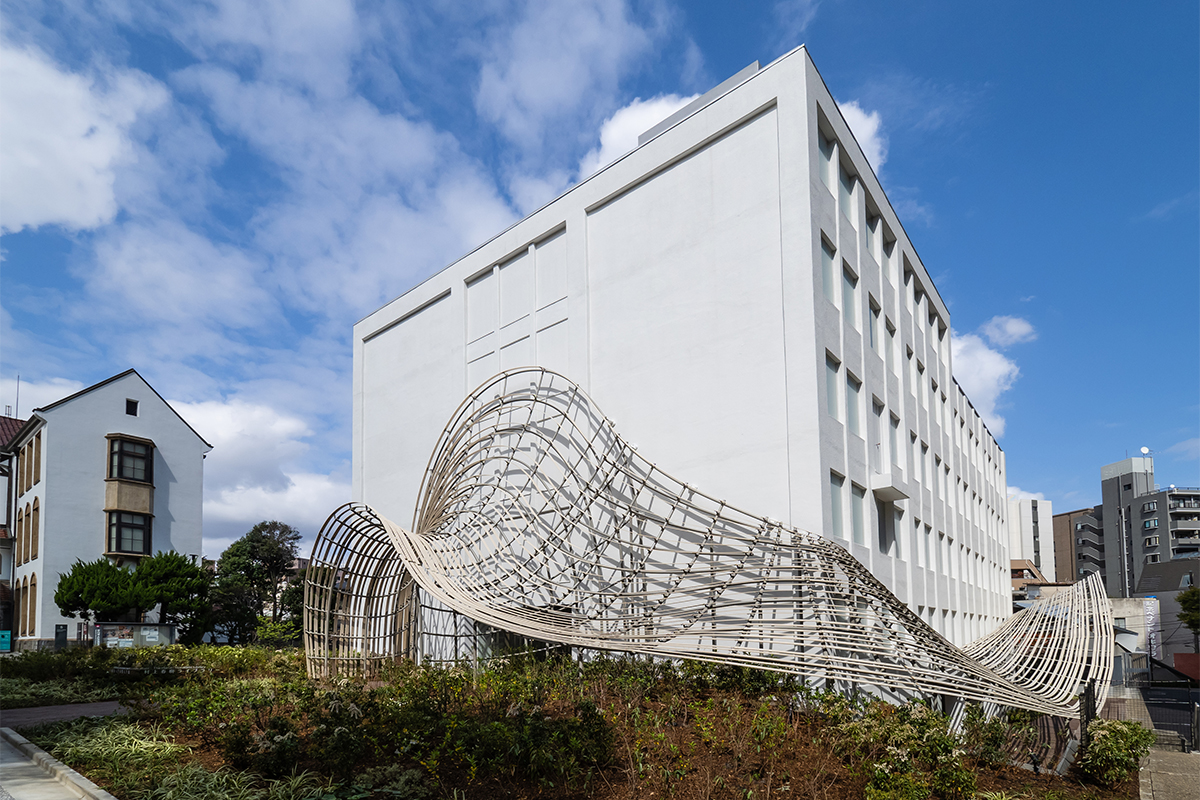

The Waseda International House of Literature aims to become a global center for literary research, mainly focusing on the study of Murakami’s works that have been translated and published in over 50 languages. He has received the Franz Kafka Prize, the Jerusalem Prize and other prestigious international literary awards. Many of his works have become international bestsellers, making him a special figure in Japanese literature.

Poet and novelist Tawada has also been active both in Japan and abroad, mainly in Germany. She has won numerous literary awards, including the prestigious Akutagawa Prize named in honor of Japanese author Ryunosuke Akutagawa and awarded biannually to up-and-coming authors; the Tanizaki Prize in Japan, an annual literary award established in honor of Japanese novelist Junichiro Tanizaki; and the Goethe Medal and Kleist Prize in Germany. She also received the National Book Award in the United States in 2018. Currently, she is actively involved in fostering young talent by holding workshops for students every year at Waseda University. In 2022, upon returning to Japan after a three-year absence due to the COVID-19 pandemic, she appeared at a reading event at the Waseda International House of Literature, where she spoke passionately about what kind of role literature can play in today’s world, while touching on the current situation in Ukraine.
Author Ogawa, whose works have also won international recognition, is another winner of the Akutagawa and Tanizaki prizes, as well as the Izumi Kyoka Prize for Literature, an annual award for newly published novels.
One of Ogawa’s works was made into a film in France, and her novel “The Memory Police” was shortlisted for the 2020 International Booker Prize.
The Waseda International House of Literature hosts talk and music events mainly led by Waseda students and alumni, and a talk session between Murakami and Ogawa was held in 2021.
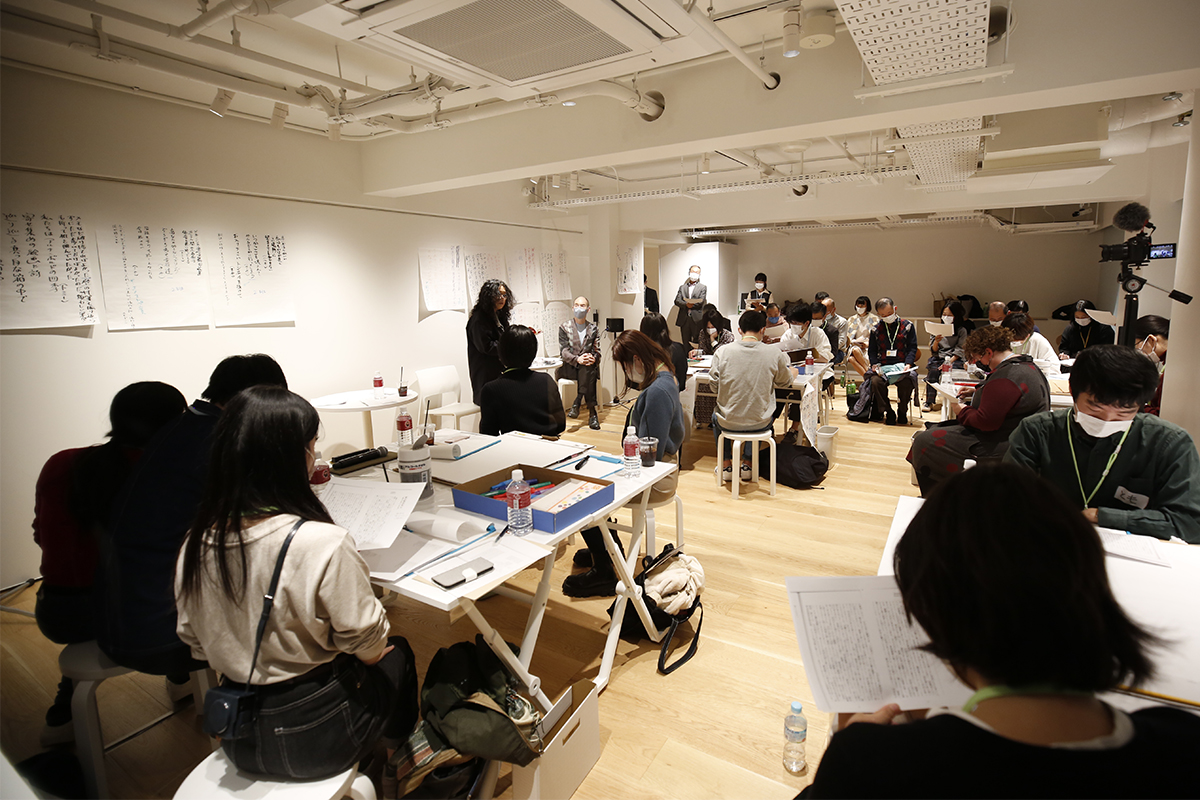
This page is sponsored by Waseda University.
Waseda University

Address: 1-104 Totsukamachi, Shinjuku-ku, Tokyo 169-8050, Japan
E-mail: [email protected]
URL: https://www.waseda.jp/top/en/



